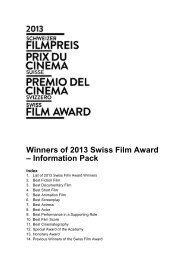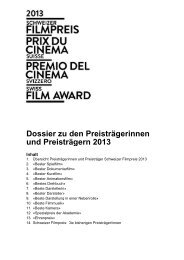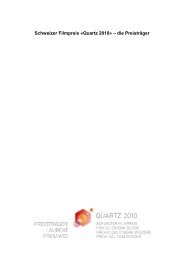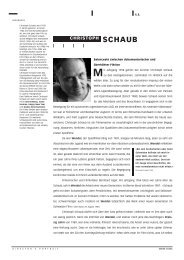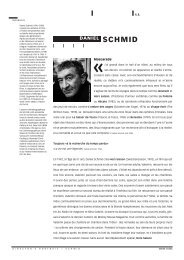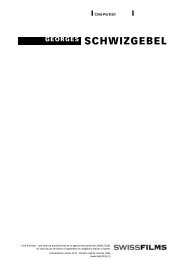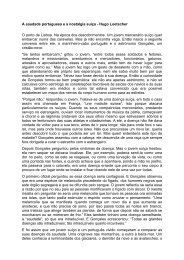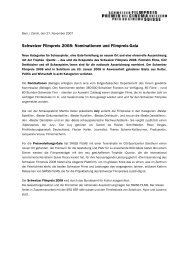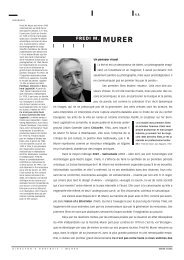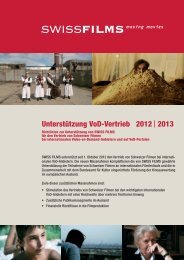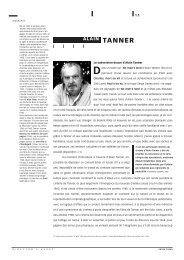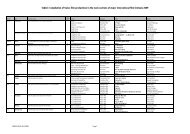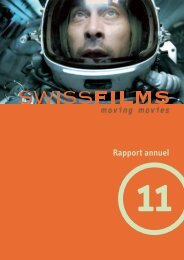Director's Portrait Fredi M. Murer - Swiss Films
Director's Portrait Fredi M. Murer - Swiss Films
Director's Portrait Fredi M. Murer - Swiss Films
You also want an ePaper? Increase the reach of your titles
YUMPU automatically turns print PDFs into web optimized ePapers that Google loves.
D I R E C T O R ’ S P O R T R A I T<br />
> Seven questions to <strong>Fredi</strong> M. <strong>Murer</strong><br />
nature” would be the environment influenced, changed or even newly created by the hand of<br />
man. This includes everything from the bright green, fertilized fields, the felled rain forests and the<br />
animals born of selective breeding, to the avenues of poplars lining straightened rivers and the<br />
skyscrapers of Manhattan. When I stand on top of the Eiffel Tower, for instance, I am surrounded as<br />
far as the eye can see by “second nature”. And although, as a film-maker, what I produce is always<br />
“second nature”, I hope that my childlike wish – that I might be able to see the area that is modern<br />
Switzerland as it was before man appeared in the Holocene period – will be fulfilled, if only in a<br />
dream. The paradox is that, in fighting against the disappearance of “first nature”, we are inevitably<br />
fighting against ourselves.<br />
Your films often portray gifted people with disabilities, or to put it another way: charac-<br />
ters with one “handicapped sense”... Although the medium of film indisputably appeals to our<br />
visual and aural senses, and the interplay between image and sound creates marvellous fusions, as<br />
a film-maker I have always been particularly fascinated by the secret of the symbiotic relationship<br />
between image and sound. In my experimental film Vision of a Blind Man, I covered my eyes and<br />
filmed “blind” for a whole day, with the camera on my shoulder. At the same time, I talked into the<br />
microphone, recounting what I was hearing, touching or feeling, or what I saw in my imagination.<br />
For an audience watching the film, the discrepancy between the actual image and what I was<br />
seeing in my mind’s eye couldn’t be more stark. Vision of a Blind Man was also a kind of “pure<br />
research” for me. The recurring themes of blindness, deafness and muteness in some of my films<br />
– the deaf boy in Alpine Fire, or the portrayal of blind people in the documentary Seeing through<br />
other eyes – reflect the fact that, to me, the act of film-making is always a reflection on seeing<br />
and hearing too.<br />
Children know you for your 1001 little magic tricks. Why didn’t you become a magician?<br />
What is reality? I am a magician! Film-making has a lot in common with magic, both literally and<br />
metaphorically: you’re constantly trying to outsmart what passes for reality. Film-makers use a box<br />
of magic tricks. We work with illusion, fakery, sensory deception: the artificial becomes realistic<br />
and the realistic is revealed as artificial… Cooking, film-making and conjuring are, to me, closely<br />
related. There’s also the show effect, and a showman is nothing without a public to perform to:<br />
a magician without an audience to enchant is just as tragic a figure as a chef with no guests or a<br />
film-maker without an audience.<br />
1.6.<br />
INTERVIEW<br />
SWISS FILMS



